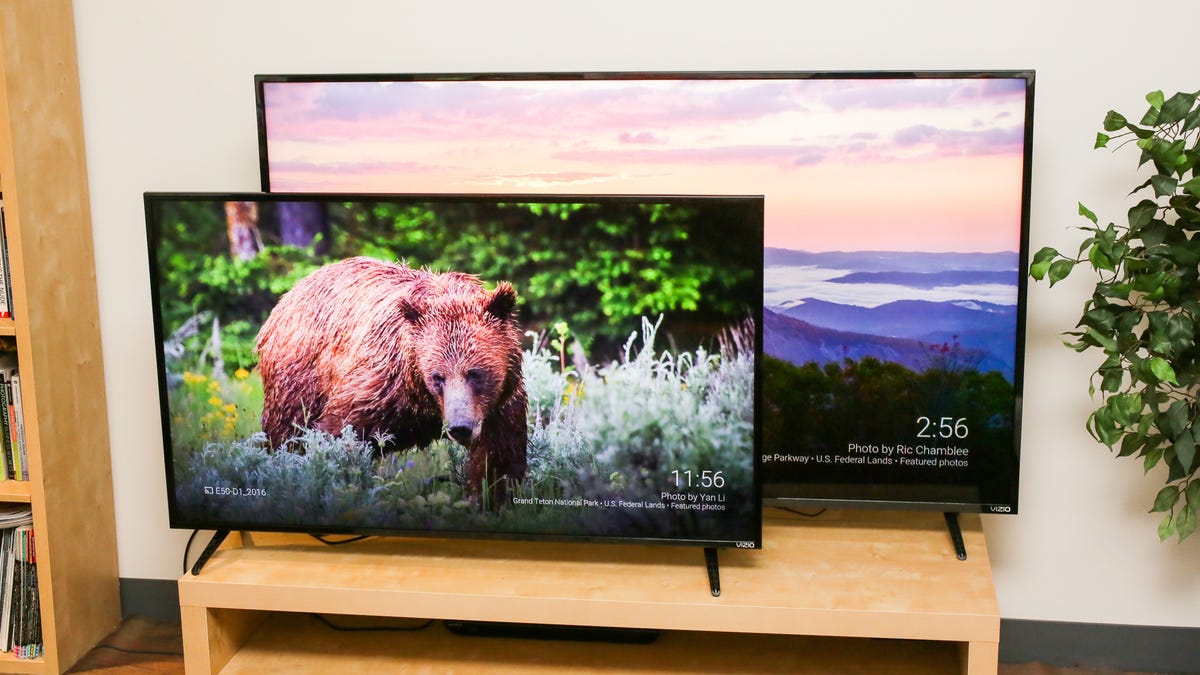Vizio to pay $2.2 million for tracking your shows
The TV maker settles FTC charges that it installed software to collect viewing data without consumer consent.

You don't have to worry about your Vizio TV spying on you anymore.
The US Federal Trade Commission on Monday said Vizio has agreed to pay $2.2 million to settle charges that it installed software on its TVs to collect viewing data on 11 million TVs -- without consumers' knowledge or consent. $1.5 million of that will go to the FTC, while $1 million will go to the New Jersey Division of Consumer Affairs (with $300,000 of that amount suspended).
A federal court order requires Vizio to now "prominently disclose and obtain affirmative express consent for its data collection and sharing practices." The order also prohibits Vizio from misrepresenting the privacy, security or confidentiality of consumer information it collects. Vizio has to delete data collected before March 1, 2016, and implement a comprehensive data privacy program and biennial assessments of its program.
"This settlement stops Vizio's unauthorized tracking, and makes clear that smart TV makers should get people's consent before collecting and sharing television viewing information," Kevin Moriarty, an attorney in the FTC's division of privacy and identity protection, said in a blog post.
Vizio said in a statement that it's "pleased" to reach a settlement.
"Going forward, this resolution sets a new standard for best industry privacy practices for the collection and analysis of data collected from today's internet-connected televisions and other home devices," Jerry Huang, Vizio's general counsel, said in the statement.
Vizio is the latest TV maker to come under fire for tracking the viewing habits of its customers. A feature that was turned on by default on more than 10 million Vizio smart TVs could track what you were watching and then share the data with advertisers. This was similar to programs we have seen in the past from Samsung and LG.
Since 2014, Vizio has manufactured smart TVs "that capture second-by-second information about video displayed on the smart TV, including video from consumer cable, broadband, set-top box, DVD, over-the-air broadcasts, and streaming devices," according to the FTC press release. Vizio also helped attach specific demographic information -- sex, age, income, marital status, household size, education level, home ownership and household value -- to the data and would then sell the information to third parties for targeted advertising and other uses.
The complaint by the FTC and New Jersey alleged that Vizio's data tracking, which took place without the consent of TV owners, was unfair and deceptive and violated the FTC Act and New Jersey consumer protection laws.
Vizio said Monday that its collection of shows viewed on Vizio TVs "never paired viewing data with personally identifiable information such as name or contact information, and the Commission did not allege or contend otherwise. Instead, as the Complaint notes, the practices challenged by the government related only to the use of viewing data in the 'aggregate' to create summary reports measuring viewing audiences or behaviors."
The company added that even before Monday's announcement, Vizio had address the concerns by updating online and onscreen disclosures. That involved sending onscreen notifications informing users about viewing data collection, reminding users of the option to turn this feature off or on and educating users about the purpose and nature of its viewing data program.
Update at 12:12 p.m. PT: adds comment from Vizio.
CNET Magazine: Check out a sample of the stories you'll find in CNET's newsstand edition.
Life, disrupted: In Europe, millions of refugees are still searching for a safe place to settle. Tech should be part of the solution. But is it? CNET investigates.

